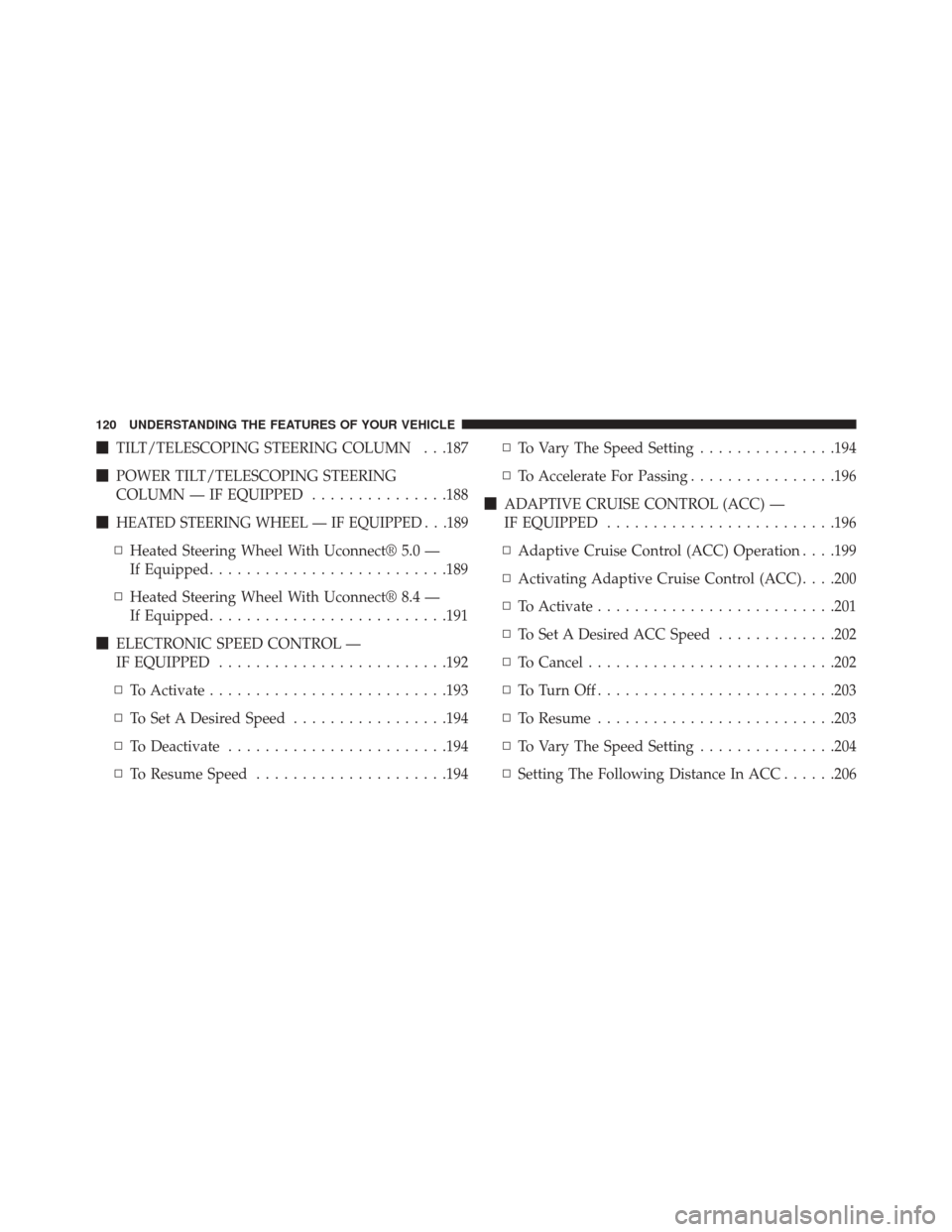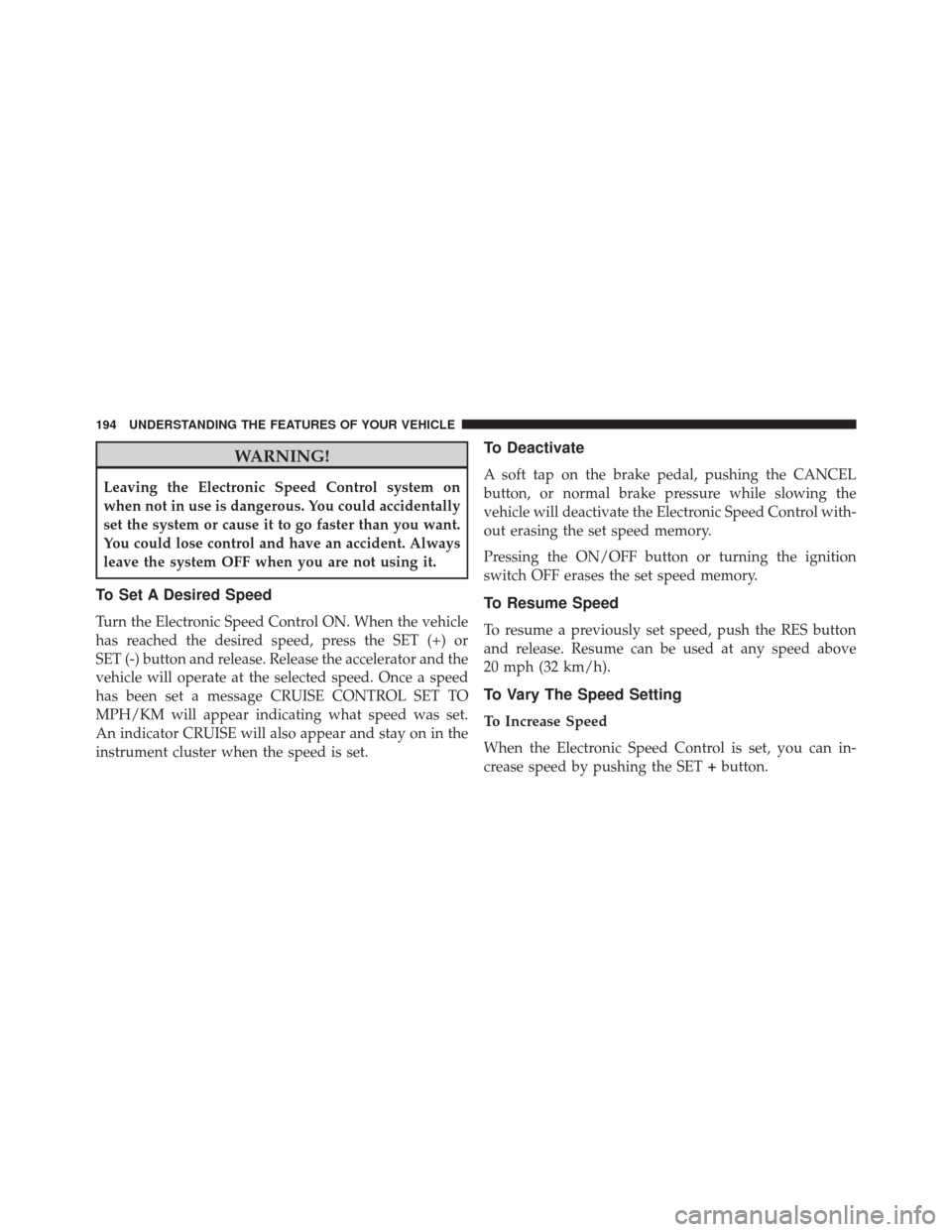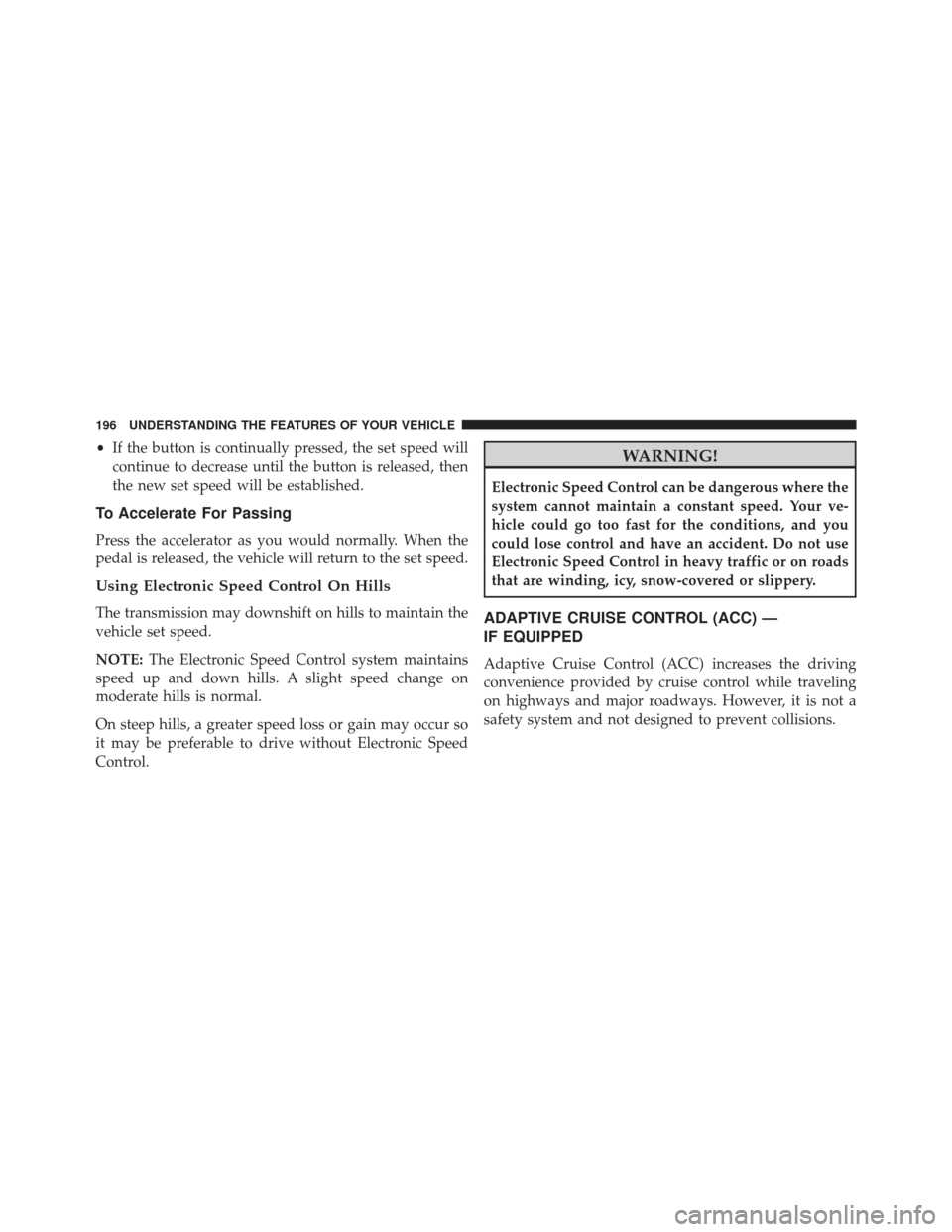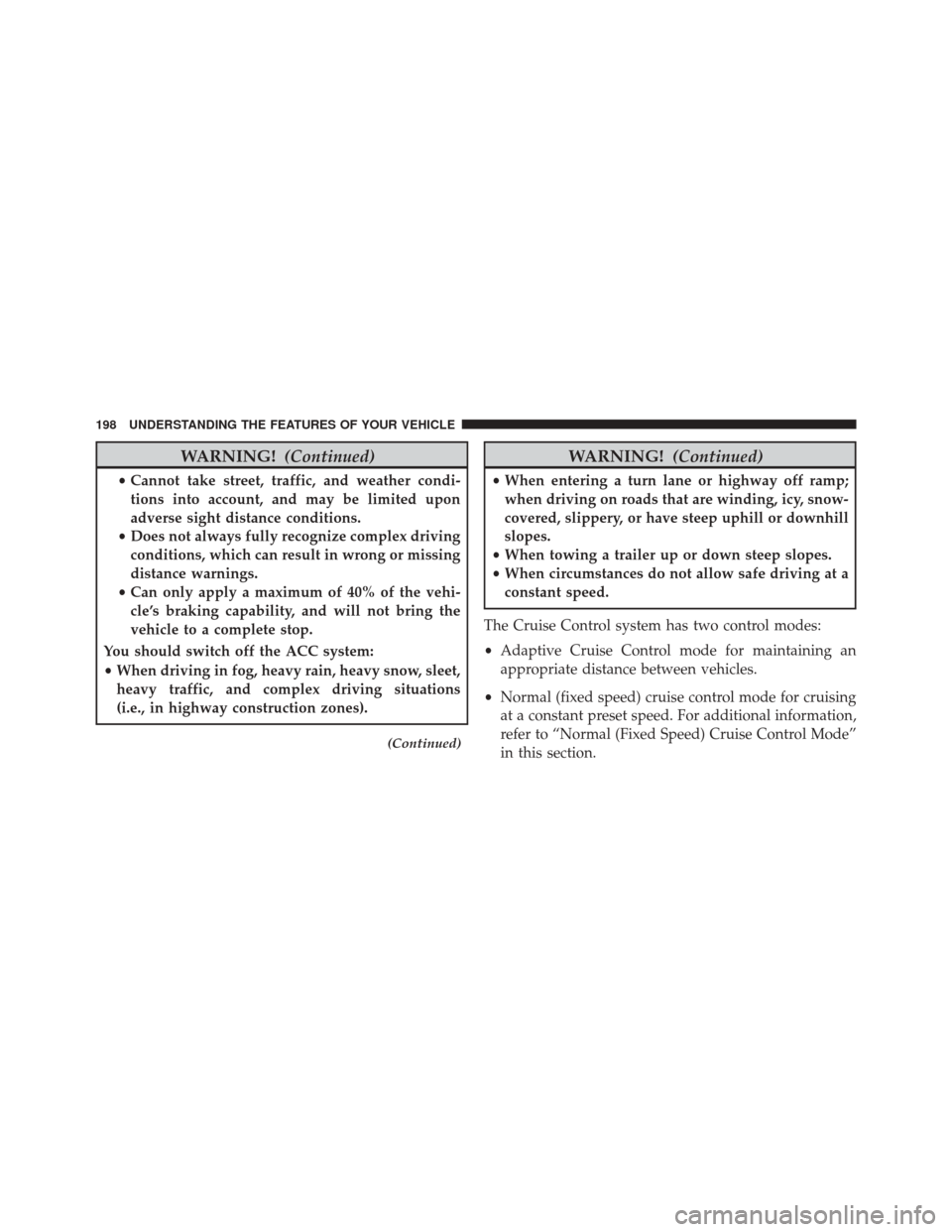Page 122 of 615

�TILT/TELESCOPING STEERING COLUMN . . .187
� POWER TILT/TELESCOPING STEERING
COLUMN — IF EQUIPPED ...............188
�
HEATED STEERING WHEEL — IF EQUIPPED . . .189
▫ Heated Steering Wheel With Uconnect® 5.0 —
If Equipped ......................... .189
▫ Heated Steering Wheel With Uconnect® 8.4 —
If Equipped ......................... .191
� ELECTRONIC SPEED CONTROL —
IF EQUIPPED ........................ .192
▫ To Activate ......................... .193
▫ To Set A Desired Speed .................194
▫ To Deactivate ....................... .194
▫ To Resume Speed .....................194 ▫
To Vary The Speed Setting ...............194
▫ To Accelerate For Passing ................196
� ADAPTIVE CRUISE CONTROL (ACC) —
IF EQUIPPED ........................ .196
▫ Adaptive Cruise Control (ACC) Operation . . . .199
▫ Activating Adaptive Cruise Control (ACC) . . . .200
▫ To Activate ......................... .201
▫ To Set A Desired ACC Speed .............202
▫ To Cancel .......................... .202
▫ ToTurnOff......................... .203
▫ To Resume ......................... .203
▫ To Vary The Speed Setting ...............204
▫ Setting The Following Distance In ACC ......206
120 UNDERSTANDING THE FEATURES OF YOUR VEHICLE
Page 123 of 615

▫Overtake Aid ....................... .210
▫ ACC Operation at Stop .................210
▫ Adaptive Cruise Control (ACC) Menu .......211
▫ Display Warnings And Maintenance ........212
▫ Precautions While Driving With ACC .......215
▫ General Information ...................219
▫ Normal (Fixed Speed) Cruise Control Mode . . .219
� FORWARD COLLISION WARNING (FCW)
WITH MITIGATION — IF EQUIPPED .......223
▫ Forward Collision Warning (FCW) With
Mitigation Operation ...................223
▫ Turning FCW ON Or OFF ...............225
▫ Changing FCW And Active Braking Status. . . .226
▫ FCW Limited Warning ..................227 ▫
Service FCW Warning ..................228
� PARKSENSE® REAR PARK ASSIST —
IF EQUIPPED ........................ .228
▫ ParkSense® Sensors ....................228
▫ ParkSense® Warning Display .............229
▫ ParkSense® Display ....................229
▫ Enabling And Disabling ParkSense® ........233
▫ Service The ParkSense® Rear Park Assist
System ............................ .233
▫ Cleaning The ParkSense® System ..........234
▫ ParkSense® System Usage Precautions .......234
� PARKSENSE® FRONT AND REAR PARK
ASSIST — IF EQUIPPED .................237
▫ ParkSense® Sensors ....................237
3
UNDERSTANDING THE FEATURES OF YOUR VEHICLE 121
Page 195 of 615
NOTE:In order to ensure proper operation, the Elec-
tronic Speed Control System has been designed to shut
down if multiple Speed Control functions are operated at
the same time. If this occurs, the Electronic Speed Control
System can be reactivated by pushing the Electronic
Speed Control ON/OFF button and resetting the desired
vehicle set speed.
To Activate
Push the ON/OFF button to activate the electronic speed
control. CRUISE CONTROL READY will appear on the
instrument cluster to indicate the electronic speed control
is on. To turn the system off, push the ON/OFF button a
second time. CRUISE CONTROL OFF will appear on the
instrument cluster to indicate the electronic speed control
is off. The system should be turned off when not in use.
Electronic Speed Control Buttons
1 — ON/OFF 4 — SET-/DECEL
2 — SET+/ACCEL 5 — CANCEL
3 — RESUME
3
UNDERSTANDING THE FEATURES OF YOUR VEHICLE 193
Page 196 of 615

WARNING!
Leaving the Electronic Speed Control system on
when not in use is dangerous. You could accidentally
set the system or cause it to go faster than you want.
You could lose control and have an accident. Always
leave the system OFF when you are not using it.
To Set A Desired Speed
Turn the Electronic Speed Control ON. When the vehicle
has reached the desired speed, press the SET (+) or
SET (-) button and release. Release the accelerator and the
vehicle will operate at the selected speed. Once a speed
has been set a message CRUISE CONTROL SET TO
MPH/KM will appear indicating what speed was set.
An indicator CRUISE will also appear and stay on in the
instrument cluster when the speed is set.
To Deactivate
A soft tap on the brake pedal, pushing the CANCEL
button, or normal brake pressure while slowing the
vehicle will deactivate the Electronic Speed Control with-
out erasing the set speed memory.
Pressing the ON/OFF button or turning the ignition
switch OFF erases the set speed memory.
To Resume Speed
To resume a previously set speed, push the RES button
and release. Resume can be used at any speed above
20 mph (32 km/h).
To Vary The Speed Setting
To Increase Speed
When the Electronic Speed Control is set, you can in-
crease speed by pushing the SET+button.
194 UNDERSTANDING THE FEATURES OF YOUR VEHICLE
Page 198 of 615

•If the button is continually pressed, the set speed will
continue to decrease until the button is released, then
the new set speed will be established.
To Accelerate For Passing
Press the accelerator as you would normally. When the
pedal is released, the vehicle will return to the set speed.
Using Electronic Speed Control On Hills
The transmission may downshift on hills to maintain the
vehicle set speed.
NOTE: The Electronic Speed Control system maintains
speed up and down hills. A slight speed change on
moderate hills is normal.
On steep hills, a greater speed loss or gain may occur so
it may be preferable to drive without Electronic Speed
Control.
WARNING!
Electronic Speed Control can be dangerous where the
system cannot maintain a constant speed. Your ve-
hicle could go too fast for the conditions, and you
could lose control and have an accident. Do not use
Electronic Speed Control in heavy traffic or on roads
that are winding, icy, snow-covered or slippery.
ADAPTIVE CRUISE CONTROL (ACC) —
IF EQUIPPED
Adaptive Cruise Control (ACC) increases the driving
convenience provided by cruise control while traveling
on highways and major roadways. However, it is not a
safety system and not designed to prevent collisions.
196 UNDERSTANDING THE FEATURES OF YOUR VEHICLE
Page 199 of 615

ACC will allow you to keep cruise control engaged in
light to moderate traffic conditions without the constant
need to reset your cruise control. ACC utilizes a radar
sensor and a forward facing camera designed to detect a
vehicle directly ahead of you.
NOTE:
•If the sensor does not detect a vehicle ahead of you,
ACC will maintain a fixed set speed.
• If the ACC sensor detects a vehicle ahead, ACC will
apply limited braking or acceleration (not to exceed
the original set speed) automatically to maintain a
preset following distance, while matching the speed of
the vehicle ahead.WARNING!
• Adaptive Cruise Control (ACC) is a convenience
system. It is not a substitute for active driving
involvement. It is always the driver ’s responsibil-
ity to be attentive of road, traffic, and weather
conditions, vehicle speed, distance to the vehicle
ahead; and, most importantly, brake operation to
ensure safe operation of the vehicle under all road
conditions. Your complete attention is always re-
quired while driving to maintain safe control of
your vehicle. Failure to follow these warnings can
result in a collision and death or serious personal
injury.
• The ACC system:
• Does not react to pedestrians, oncoming vehicles,
and stationary objects (e.g., a stopped vehicle in a
traffic jam or a disabled vehicle).
(Continued)
3
UNDERSTANDING THE FEATURES OF YOUR VEHICLE 197
Page 200 of 615

WARNING!(Continued)
•Cannot take street, traffic, and weather condi-
tions into account, and may be limited upon
adverse sight distance conditions.
• Does not always fully recognize complex driving
conditions, which can result in wrong or missing
distance warnings.
• Can only apply a maximum of 40% of the vehi-
cle’s braking capability, and will not bring the
vehicle to a complete stop.
You should switch off the ACC system:
• When driving in fog, heavy rain, heavy snow, sleet,
heavy traffic, and complex driving situations
(i.e., in highway construction zones).
(Continued)
WARNING! (Continued)
•When entering a turn lane or highway off ramp;
when driving on roads that are winding, icy, snow-
covered, slippery, or have steep uphill or downhill
slopes.
• When towing a trailer up or down steep slopes.
• When circumstances do not allow safe driving at a
constant speed.
The Cruise Control system has two control modes:
• Adaptive Cruise Control mode for maintaining an
appropriate distance between vehicles.
• Normal (fixed speed) cruise control mode for cruising
at a constant preset speed. For additional information,
refer to “Normal (Fixed Speed) Cruise Control Mode”
in this section.
198 UNDERSTANDING THE FEATURES OF YOUR VEHICLE
Page 201 of 615
NOTE:Normal (fixed speed) cruise control will not react
to preceding vehicles. Always be aware of the mode
selected.
You can change the mode by using the Cruise Control
buttons. The two control modes function differently.
Always confirm which mode is selected.
Adaptive Cruise Control (ACC) Operation
The speed control buttons (located on the right side of the
steering wheel) operates the ACC system.
Adaptive Cruise Control Buttons
1 — NORMAL (FIXED SPEED) CRUISE CONTROL ON/OFF
2 — SET+/ACCEL
3 — RESUME
4 — SET-/DECEL
5 — DISTANCE SETTING — INCREASE
6 — ADAPTIVE CRUISE CONTROL (ACC) ON/OFF
7 — DISTANCE SETTING — DECREASE
8 — CANCEL
3
UNDERSTANDING THE FEATURES OF YOUR VEHICLE 199